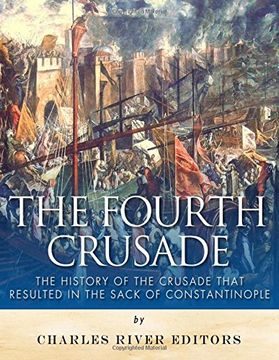The Fourth Crusade: The History of the Crusade That Resulted in the Sack of Constantinople (en Inglés)
Reseña del libro "The Fourth Crusade: The History of the Crusade That Resulted in the Sack of Constantinople (en Inglés)"
*Includes pictures *Includes accounts of the standoff by federal agents and members of the Branch Davidians *Includes online resources and a bibliography for further reading *Includes a table of contents "The Latin soldiery subjected the greatest city in Europe to an indescribable sack. For three days they murdered, raped, looted and destroyed on a scale which even the ancient Vandals and Goths would have found unbelievable." - Speros Vryonis, Byzantium and Europe The Fourth Crusade from 1202-1204 is significant in medieval history because it was the first time a crusade was directed against another Christian group. It was also significant since it encompassed two of the four major sieges of Constantinople, and it also sparked a third in 1235 (an unsuccessful attempt to reverse the Latin gains in 1204). Given that legacy, it's ironic that like the Crusades before it, the Fourth Crusade was originally intended as an invasion of Egypt, which had been conquered by Saladin and his uncle nearly four decades earlier. Egypt had been joined with Syria into one Muslim empire under Saladin, but it had fallen apart into two separate realms after his death shortly after the Third Crusade in 1193. Following that crusade, the main objective of the Crusaders in the 13th century was to conquer Egypt and use it as a beachhead against the Muslims in Syria who threatened Christian Palestine, a goal that should have been beneficial to all of Christendom in both the West and East. Instead, during the Fourth Crusade, tensions between the Latin Christians of Western Europe and the Greek Christians of Constantinople came to a head after a century and three previous Crusades. This resulted in a critical breakdown of communications that resulted in an internal war within Christendom and led to the sack of Constantinople by the Crusaders. After this, the Crusaders established a Latin Kingdom in Constantinople for nearly 60 years, but it remained shaky and was eventually retaken by the Byzantine Greeks. The Fourth Crusade was also a result of the imperialist ambitions of Pope Innocent III, one of the strongest and proudest popes of the Middle Ages, and it was a precursor of the Albigensian Crusade, the first true "internal" crusade. With that, the Latin Christians began to lose focus on the dwindling territories in Palestine, and instead Christians fell upon each other, engaging in Crusades against other Christian groups and bleeding much-needed support from the Latin kingdoms in Palestine. In the west, the Fourth Crusade also saw the rise in power of the Byzantines' most bitter rivals in the West: the Venetians and Genoese. The Venetian Doge was later blamed for inciting the Crusaders to fall upon his Byzantine enemies, and while the situation was more complicated than that, the involvement of the Venetians in the altered direction of the Crusade cannot be denied. Thus, even though no one realized it at the time, the Fourth Crusade was the turning point for the Crusades; after this one, the slow decline toward the Latin Christians losing the Holy Land became inevitable. Constantinople, whether as a Greek or a Latin Empire, was also fatally weakened and would eventually fall to the Ottoman Turks in 1453, long after the end of the Crusades. The Fourth Crusade would inevitably lead to the fall of the Crusader states less than a century later and also the fall of Constantinople two and a half centuries later to the Muslims. The latter would be a permanent loss to Christianity, while Christian forces would not regain control of Palestine until the 20th century. The Fourth Crusade: The History of the Crusade that Resulted in the Sack of Constantinople chronicles one of the most controversial events of the Middle Ages. Along with pictures of important people, places, and events, you will learn about the 4th Crusade like never before, in no time at all.

